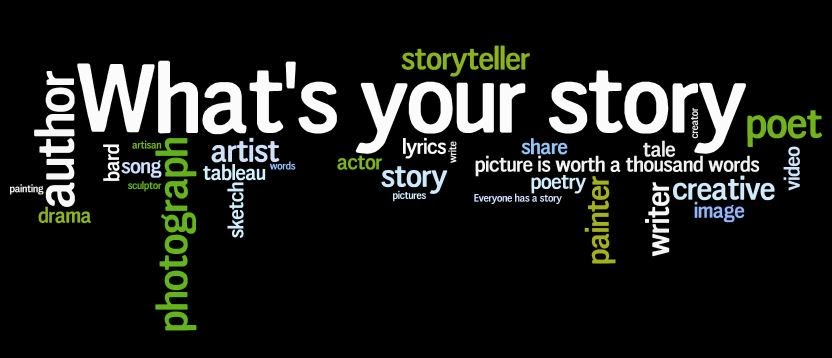We all have a story to tell...
Stories upon stories line the bookshelves
of my imagination and memory…Or at least they once did.
The purpose of a
storyteller is not to tell you how to think, but to give you questions to think
upon.
― Brandon Sanderson, The Way of Kings
I was inspired by last Thursday’s EDCI569
class when Alan Levine was guest presenter. The topic? Digital Storytelling. I've been aware of the term, “Digital
Storytelling”, for quite some time, but admittedly, wasn't entirely sure that I
knew exactly what it was. I was reassured by the discussion that ensued; "digital storytelling" is what it says it is—the telling of stories using
technology. The age-old tradition of
storytelling, which has seen rounds of evolutionary shifts over time, impacted
by various technological advances, continues to be an integral aspect of culture.
After nourishment, shelter and companionship,
stories are the thing we need most in the world.
― Philip Pullman
The concrete (and exciting) examples
provided by Alan during our session were somehow reassuring to me. I was reminded that storytelling can be a fantastically creative commentary on our world, time, and our own experiences. However, I
also came to the realization that, as educators especially, many of us have reduced the concept of “story” to the very limited framework of “beginning, middle and end”. If we consider some of the greatest literary
works of modern times, such as Emily Bronte's Wuthering Heights or James Joyce's Ulysses, or thinking of films such as Quentin Tarantino's Reservoir Dogs, all told in a nonlinear style-- no tidy beginning-middle-end
format--yet so much of what we present to our learners centers on the this
premise of order and calculation. Much
like many people decide early on that they can’t sing or draw or play sports, I
suspect a number of people quickly decide that they can’t generate a great story. I was reassured and reminded during our class discussion that we all have the potential to be skilled storytellers in various contexts and felt encouraged to consider my own abilities in this rite.
In reflecting these past few days, I
suddenly realized that my own quirky fitbit video updates are, in fact, examples
digital storytelling. Who knew? I’d been creating and participating in
storytelling of my own and didn't even have the awareness to realize that my
efforts qualified as storytelling. Since @cogdog’s presentation, I've
been exploring some of the DS106 website as well as other sites to look at
other examples of digital storytelling.
I’m most awestruck by the work that is created as a representational
image—because of the visual artistry—and the fact that it reminds me that a
painting, a photograph, a sculpture—are all examples of storytelling. Over time, and I mean a really long time, I have
naiively accepted that a story is a story in that more traditional sense. I
appreciate many forms of art, but have forgotten to consider the story each piece may be attempting to tell. I agree with Liane Loepky who shared in a recent blogpost the idea "that storytelling somehow becomes this programmed piece as students get older. What
begins in Kindergarten as a game, as a fun, imaginative activity, somehow
becomes a formulaic story with the ‘beginning, middle and end’” restrictive
framework.
A story has no beginning or end: arbitrarily one chooses that moment of experience from which to look back or from which to look ahead.
― Graham Greene, The End of the Affair
I’m excited about digital storytelling and
the opportunity it presents to repeatedly redefine and stretch what qualifies
as a story. I’m excited to encourage and nurture creativity and storytelling in
learners who might not believe they can tell a story or have a story to tell. And, I’m perhaps most excited to continue telling
stories with a heightened awareness of my own role as storyteller, to tell my
stories in different ways using different tools, and to rediscover my own
creativity.
The assignment suggestions on the DS106
site have left me buzzing. While I don’t have my own “classroom” as a Special
Education Teacher, nor much opportunity to direct learners to specific learning
activities, I am looking forward to sharing the possibilities and inspiration
with my colleagues. The highlight of our Digital Storytelling discussion for me, however, was my own epiphanic moment that I am, still, a storyteller with many stories to tell. My bookshelves are, indeed, very full.


No comments:
Post a Comment